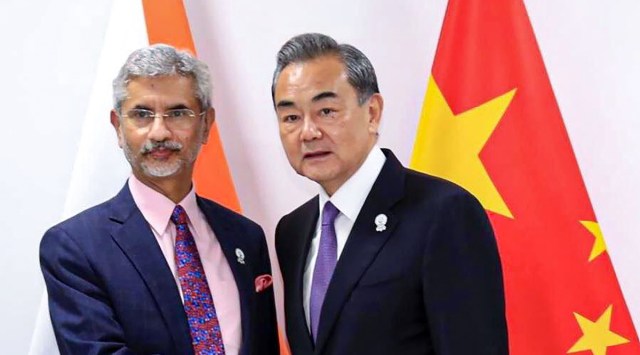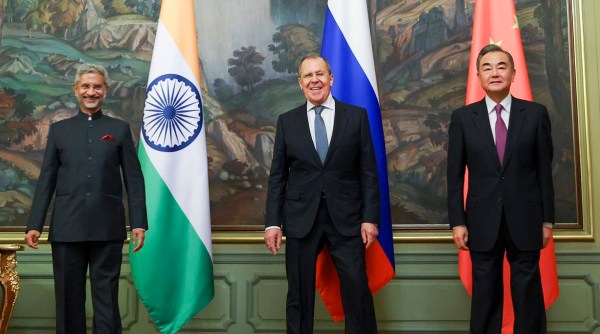- India
- International
Jaishankar, Wang agree: Let’s keep talking, quickly disengage, ease tensions along LAC
India, China adopt 5-point approach to resolve border crisis; divergences remain, Jaishankar links early resolution to ties.
 Sunday’s remarks also come after Wang Yi and External Affairs Minister S Jaishankar had a 75-minute phone conversation February 26. (PTI Photo/File)
Sunday’s remarks also come after Wang Yi and External Affairs Minister S Jaishankar had a 75-minute phone conversation February 26. (PTI Photo/File)Adopting a five-point approach to resolve the crisis along the Line of Actual Control in Ladakh where the situation has taken a turn for the worse in recent days, India and China announced Friday they had agreed that their troops “should continue their dialogue, quickly disengage, maintain proper distance and ease tensions”.
A joint statement, issued after a two-and-a-half-hour meeting Thursday night in Moscow between External Affairs Minister S Jaishankar and Chinese State Councillor and Foreign Minister Wang Yi, said the ministers “agreed that the current situation in the border areas is not in the interest of either side”.
The first such joint statement — the practice so far was to issue separate statements — said the ministers had a “frank and constructive discussion on the developments in the India-China border areas as well as on India-China relations”. This underlines the broad expanse of the conversation, and not just the border issue.
Opinion | Neither war nor peace
Jaishankar and Wang held direct talks on the sidelines of a meeting of Foreign Ministers of the Shanghai Cooperation Organisation.
Ever since the standoff began early May, India has been insisting on status quo ante — of troops on the two sides returning to their April locations. The emphasis in the statement on “quick” disengagement and “maintaining distance” reflects the urgency over the situation in Ladakh, especially on the north and south banks of Pangong Tso where troops are within firing range of each other.

Although divergences remain, the joint statement invoked the consensus among the leaders of the two countries, developed since the June 2017 meeting in Astana between Prime Minister Narendra Modi and Chinese President Xi Jinping, and reiterated at the two informal summits in Wuhan and Mahabalipuram.
Also read | Pangong Fingers hot up: Scramble for heights as PLA men mass on ridge, India sends more troops
“The two Ministers agreed that both sides should take guidance from the series of consensus of the leaders on developing India-China relations, including not allowing differences to become disputes,” the joint statement said.
It said they also agreed that “both sides shall abide by all the existing agreements and protocol on China-India boundary affairs, maintain peace and tranquillity in the border areas and avoid any action that could escalate matters”.
The two sides, the statement said, “agreed to continue to have dialogue and communication through the Special Representative mechanism on the India-China boundary question. They also agreed in this context that the Working Mechanism for Consultation and Coordination on India-China border affairs (WMCC), should also continue its meetings”.
“The Ministers agreed that as the situation eases, the two sides should expedite work to conclude new Confidence Building Measures to maintain and enhance peace and tranquillity in the border areas,” it stated.
This was a reference to the firing incident recently – the first in 45 years along the LAC — and the June 15 Galwan Valley incident in which 20 Indian Army personnel and an unspecified number of Chinese soldiers were killed in clashes.
 From left: S. Jaishankar, Sergey Lavrov and Wang Yi pose for a photo in Moscow, Russia, Thursday, Sept. 10. 2020. (AP/PTI Photo)
From left: S. Jaishankar, Sergey Lavrov and Wang Yi pose for a photo in Moscow, Russia, Thursday, Sept. 10. 2020. (AP/PTI Photo)
At the meeting, sources said, Jaishankar underlined that since the resumption of Ambassador-level relations in 1976 and holding of boundary talks from 1981, India-China relations “have developed on a largely positive trajectory”. While there have been incidents from time to time, peace and tranquility have largely prevailed in the border areas, Jaishankar was quoted as having said.
As a result, he said, India-China cooperation also developed in a broad range of domains, giving the relationship a “more substantive character”.
While the Indian side recognized that a solution to the boundary question required time and effort, sources said Jaishankar made it “clear that maintenance of peace and tranquility in the border areas is essential to the forward development of ties”.
Read | Rafale jets induction a stern message for those eyeing India’s sovereignty: Rajnath Singh
Jaishankar told Wang that “recent incidents in eastern Ladakh, however, inevitably impacted the development of the bilateral relationship”. Therefore, “an urgent resolution of the current situation was in the interest of both nations”, sources quoted him as having said.
At the meeting, the Indian side highlighted “its strong concern at the massing of Chinese troops with equipment along the LAC. The presence of such a large concentration of troops was not in accordance with the 1993 and 1996 agreements and created flashpoints along the LAC”.
The Chinese side, sources said, has not provided a credible explanation for this deployment. The provocative behaviour of Chinese frontline troops during numerous incidents of friction along the LAC, sources said, showed disregard for bilateral agreements and protocols.
“The Indian side clearly conveyed that it expected full adherence to all agreements on management of border areas and would not countenance any attempt to change the status quo unilaterally. It was also emphasized that Indian troops had scrupulously followed all agreements and protocols pertaining to the management of the border areas,” sources said.
Opinion | The tough get going
The immediate task, sources said, is to ensure comprehensive disengagement of troops in all friction areas. “That is necessary to prevent any untoward incident in the future. The final disposition of troop deployment to their permanent posts and the phasing of the process is to be worked out by the military commanders,” sources said.
The Chinese Foreign Ministry, in its account of the meeting, said Wang noted that it is normal for China and India to have differences as two neighbouring major countries.
“What is important is to put these differences in a proper context vis-a-vis bilateral relations. The key to that is to take guidance from the strategic consensus between the Chinese and Indian leaders that China and India are not competitive rivals, or each other’s threats. But cooperation partners, and each other’s developmental opportunities,” the Chinese statement said.
Wang, it said, stressed that as two large developing countries, emerging rapidly, what China and India need right now is cooperation, not confrontation; and mutual trust, not suspicion. Whenever the situation gets difficult, it is all the more important to ensure the stability of the overall relationship and preserve mutual trust, it said.
Wang said China-India relations have once again come to a crossroads. But as long as the two sides keep moving the relationship in the right direction, there will be no difficulty or challenge that cannot be overcome, the statement said.
At Express Adda | Jaishankar on India-China standoff in Ladakh: ‘Serious situation… need deep conversations at political level’
Wang, it said, outlined “China’s stern position” on the situation in the border areas, emphasizing that the imperative is to immediately stop provocations, such as firing, and other dangerous actions that violate the commitments made by the two sides.
“It is also important to move back all personnel and equipment that have trespassed. Frontier troops must quickly disengage so that the situation may de-escalate,” the statement said.
The Chinese said Jaishankar noted that the Indian side does not want tensions to escalate in the border areas.
In Moscow, at a press conference with Russian Foreign Minister Sergey Lavrov, Wang, responding to a question on his talks with Jaishankar, said: “We are ready to meet them halfway.”
Editorial | Five point reprieve
He said they had a mutual understanding not to allow violation of any agreement in the border region. “I am talking about the warning shots,” he said, referring to the recent incident in Mukpari in the Chushul sector.
He also said, “we must take the troops and military equipment away”. It is very important to resume the stability and calm the situation on the border, he said, adding that to make this happen, they will continue talks.
Lavrov, on his part, said, “We are very happy that Moscow has presented a platform to Russia, China and India to have this very productive, fruitful meeting whose goal is to stabilise the situation on the border between India and China.”
Apr 26: Latest News
- 01
- 02
- 03
- 04
- 05








































